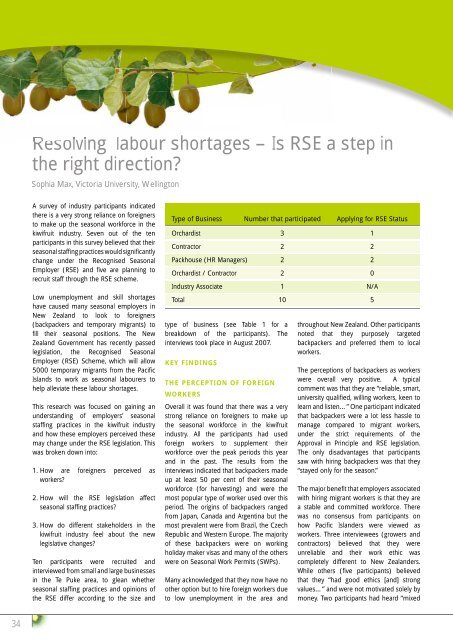Thirsty vines Summer girdling Compost teas Organic marketing The ...
Thirsty vines Summer girdling Compost teas Organic marketing The ...
Thirsty vines Summer girdling Compost teas Organic marketing The ...
You also want an ePaper? Increase the reach of your titles
YUMPU automatically turns print PDFs into web optimized ePapers that Google loves.
34<br />
Resolving labour shortages – Is RSE a step in<br />
the right direction?<br />
Sophia Max, Victoria University, Wellington<br />
A survey of industry participants indicated<br />
there is a very strong reliance on foreigners<br />
to make up the seasonal workforce in the<br />
kiwifruit industry. Seven out of the ten<br />
participants in this survey believed that their<br />
seasonal staffi ng practices would signifi cantly<br />
change under the Recognised Seasonal<br />
Employer (RSE) and fi ve are planning to<br />
recruit staff through the RSE scheme.<br />
Low unemployment and skill shortages<br />
have caused many seasonal employers in<br />
New Zealand to look to foreigners<br />
(backpackers and temporary migrants) to<br />
fi ll their seasonal positions. <strong>The</strong> New<br />
Zealand Government has recently passed<br />
legislation, the Recognised Seasonal<br />
Employer (RSE) Scheme, which will allow<br />
5000 temporary migrants from the Pacifi c<br />
Islands to work as seasonal labourers to<br />
help alleviate these labour shortages.<br />
This research was focused on gaining an<br />
understanding of employers’ seasonal<br />
staffi ng practices in the kiwifruit industry<br />
and how these employers perceived these<br />
may change under the RSE legislation. This<br />
was broken down into:<br />
1. How are foreigners perceived as<br />
workers?<br />
2. How will the RSE legislation affect<br />
seasonal staffi ng practices?<br />
3. How do different stakeholders in the<br />
kiwifruit industry feel about the new<br />
legislative changes?<br />
Ten participants were recruited and<br />
interviewed from small and large businesses<br />
in the Te Puke area, to glean whether<br />
seasonal staffi ng practices and opinions of<br />
the RSE differ according to the size and<br />
Type of Business Number that participated Applying for RSE Status<br />
Orchardist 3 1<br />
Contractor 2 2<br />
Packhouse (HR Managers) 2 2<br />
Orchardist / Contractor 2 0<br />
Industry Associate 1 N/A<br />
Total 10 5<br />
type of business (see Table 1 for a<br />
breakdown of the participants). <strong>The</strong><br />
interviews took place in August 2007.<br />
KEY FINDINGS<br />
THE PERCEPTION OF FOREIGN<br />
WORKERS<br />
Overall it was found that there was a very<br />
strong reliance on foreigners to make up<br />
the seasonal workforce in the kiwifruit<br />
industry. All the participants had used<br />
foreign workers to supplement their<br />
workforce over the peak periods this year<br />
and in the past. <strong>The</strong> results from the<br />
interviews indicated that backpackers made<br />
up at least 50 per cent of their seasonal<br />
workforce (for harvesting) and were the<br />
most popular type of worker used over this<br />
period. <strong>The</strong> origins of backpackers ranged<br />
from Japan, Canada and Argentina but the<br />
most prevalent were from Brazil, the Czech<br />
Republic and Western Europe. <strong>The</strong> majority<br />
of these backpackers were on working<br />
holiday maker visas and many of the others<br />
were on Seasonal Work Permits (SWPs).<br />
Many acknowledged that they now have no<br />
other option but to hire foreign workers due<br />
to low unemployment in the area and<br />
throughout New Zealand. Other participants<br />
noted that they purposely targeted<br />
backpackers and preferred them to local<br />
workers.<br />
<strong>The</strong> perceptions of backpackers as workers<br />
were overall very positive. A typical<br />
comment was that they are “reliable, smart,<br />
university qualifi ed, willing workers, keen to<br />
learn and listen…” One participant indicated<br />
that backpackers were a lot less hassle to<br />
manage compared to migrant workers,<br />
under the strict requirements of the<br />
Approval in Principle and RSE legislation.<br />
<strong>The</strong> only disadvantages that participants<br />
saw with hiring backpackers was that they<br />
“stayed only for the season.”<br />
<strong>The</strong> major benefi t that employers associated<br />
with hiring migrant workers is that they are<br />
a stable and committed workforce. <strong>The</strong>re<br />
was no consensus from participants on<br />
how Pacifi c Islanders were viewed as<br />
workers. Three interviewees (growers and<br />
contractors) believed that they were<br />
unreliable and their work ethic was<br />
completely different to New Zealanders.<br />
While others (fi ve participants) believed<br />
that they “had good ethics [and] strong<br />
values…” and were not motivated solely by<br />
money. Two participants had heard “mixed


